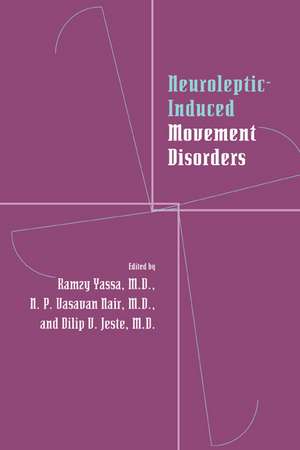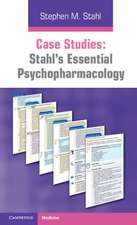Neuroleptic-induced Movement Disorders: A Comprehensive Survey
Editat de Ramzy Yassa MD, N. P. V. Nair MD, Dilip V. Jeste MDen Limba Engleză Paperback – 31 ian 2007
Preț: 762.06 lei
Preț vechi: 802.17 lei
-5% Nou
Puncte Express: 1143
Preț estimativ în valută:
145.87€ • 158.50$ • 122.61£
145.87€ • 158.50$ • 122.61£
Carte tipărită la comandă
Livrare economică 21 aprilie-05 mai
Preluare comenzi: 021 569.72.76
Specificații
ISBN-13: 9780521033527
ISBN-10: 0521033527
Pagini: 516
Ilustrații: 22 b/w illus. 24 tables
Dimensiuni: 152 x 228 x 31 mm
Greutate: 0.75 kg
Ediția:Revised
Editura: Cambridge University Press
Colecția Cambridge University Press
Locul publicării:New York, United States
ISBN-10: 0521033527
Pagini: 516
Ilustrații: 22 b/w illus. 24 tables
Dimensiuni: 152 x 228 x 31 mm
Greutate: 0.75 kg
Ediția:Revised
Editura: Cambridge University Press
Colecția Cambridge University Press
Locul publicării:New York, United States
Cuprins
Contributors; Preface; Part I. Historical Perspective: 1. Neuroleptic-induced movement disorders: historical perspective Marc-Alain Wolf, Ramzy Yassa and Pierre-Michel Llorca; Part II. Clinical Aspects of Tardive Dyskinesia: 2. Aging and tardive dyskinesia Bruce L. Saltz, John M. Kane, Margaret G. Woerner, Jeffrey A. Lieberman and José Ma. J. Alvir; 3. Gender as a factor in the development of tardive dyskinesia Ramzy Yassa and Dilip V. Jeste; 4. The Yale tardive dyskinesia study: a prospective incidence study among long-term outpatients William M. Glazer, Hal Morgenstern, Donna Raye Wagner and John Doucette; 5. Vulnerability to tardive dyskinesia in schizophrenia: an exploration of individual patient factors John L. Waddington, Eadbhard O'Callaghan, Peter Buckely, Cathy Madigan, Conall Larkin and Anthony Kinsella; 6. Tardive dyskinesia and affective disorder George Gardos and Jonathan O. Cole; 7. Diabetes mellitus and tardive dyskinesia Sukdeb Mukherjee and Sahebarao P. Mahadik; 8. Other factors in the development of tardive dyskinesia Ramzy Yassa; 9. Neuroleptic treatment and tardive dyskinesia George Gardos and Jonathan O. Cole; 10. Anticholinergic drugs as factors in the development of tardive dyskinesia Ramzy Yassa and N. P. V. Nair; Part III. Mechanisms Underlying Tardive Dyskinesia: 11. Neurochemistry of the basal ganglia N. P. V. Nair and T. E. G. West; 12. A reanalysis of the dopamine theory of tardive dyskinesia: the hypothesis of dopamine D1/D2 imbalance Linda Peacock and Jes Gerlach; 13. Tardive dyskinesia and phenylalanine metabolism: risk-factor studies Mary Ann Richardson, Cheryl Flynn, Laura Read, Margaret Reilly and Raymond Suckow; 14. Neuroendocrinological studies of tardive dyskinesia Margot Albus; 15. Cognitive deficits and tardive dyskinesia Marion E. Wolf, Alan S. DeWolfe and Aron D. Mosnaim; 16. Studies of tardive dyskinesia using computed tomography and magnetic-resonance imaging Christian L. Shriqui; 17. Rodent and other animal models of tardive dyskinesia during long-term neuroleptic-drug administration: controversies and implications for the clinical syndrome John L. Waddington; Part IV. Measurement of Tardive Dyskinesia: 18. Instrument measurements of tardive dyskinesia Michael P. Caligiuri; Part V. Tardive Dyskinesia in Different Populations: 19. Cultural aspects of tardive dyskinesia in Asia Shigeto Yamawaki, Teruo Hayashi; Ikuo Nagaoka, Hiroshi Saitoh, Norio Yokota and Yosuke Uchitomi; 20. Tardive dyskinesia in North America and the Middle East Driss Moussaoui; 21. Tardive dyskinesia in Europe H. A. McClelland and T. A. Kerr; 22. Role of ethnicity in the development of tardive dyskinesia Jonathan P. Lacro and Dilip V. Jeste; 23. Tardive dyskinesia in children and adolescents Mark Magulac and Dilip V. Jeste; Part VI. Other Neuropleptic-Induced Movement Disorders: 24. Drug-induced parkinsonism Thomas E. Hansen and William F. Hoffman; 25. Clinical aspects of neuroleptic-induced dystonia George A. Keepers and Linda Ganzini; 26. Tardive dystonia Paul Greene; 27. Tardive akathisia Robert E. Burke; Part VII. Treatment of Tardive Dyskinesia: 28. Development of novel antipsychotic drugs with reduced extrapyramidal side effects Allan Z. Safferman, Jeffrey A. Lieberman, Bruce J. Kinon, Daniel Umbricht, Jeffrey S. Aronowitz and John M. Kane; 29. GABAergic treatments for tardive dyskinesia Shawn L. Cassady, Gunvant K. Thaker and Carol A. Tamminga; 30. Using biofeedback to train suppression of the oral-lingual movements of tardive dyskinesia Ronald C. Fudge and Cecile E. Sison; Index.
Recenzii
"This is an excellent new book...Written and edited by internationally recognized experts in the field, this book is a valuable contribution to psychiatry...Any clinician who is involved in the treatment of patients with chronic psychoses should read and refer to this book." Michael J. Schrift, Doody's Health Sciences Book Review Journal
"The book enhances our understanding of TD's neurobiological basis, and thus, it might help us to find new antipsychotics with anti-dyskinetic properties and other treatment strategies that could be used in the management of TD....this text is a comprhensive reference for researchers, psychiatrists and neurologists. It would be a useful addition to departmental and academic libraries." R. Ramasubbu, MD, FRCPC, Annals RCPSC
"This will be helpful for residents, fellows, practicing psychiatrists, researchers, and clinical neurologists with interest in Movement Disorders....the authors should be congratulated for completing the great task of writing this book..." S. Das, The Canadian Journal of Neurological Sciences
"The book enhances our understanding of TD's neurobiological basis, and thus, it might help us to find new antipsychotics with anti-dyskinetic properties and other treatment strategies that could be used in the management of TD....this text is a comprhensive reference for researchers, psychiatrists and neurologists. It would be a useful addition to departmental and academic libraries." R. Ramasubbu, MD, FRCPC, Annals RCPSC
"This will be helpful for residents, fellows, practicing psychiatrists, researchers, and clinical neurologists with interest in Movement Disorders....the authors should be congratulated for completing the great task of writing this book..." S. Das, The Canadian Journal of Neurological Sciences
Descriere
Deals with historical, clinical and neurobiological aspects of movement disorders commonly associated with neuroleptic drugs.














